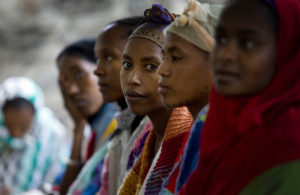
DAWN and the Setaweet Movement from Ethiopia made at CEDAW 72nd session an oral statement on the situation of women and girls in that country, based on the shadow report presented to the CEDAW Committee. Samrawit Bekele Genet, from Setaweet Movement, said that Ethiopia is undergoing massive changes and that significant strides have been made in improving the lives of Ethiopian women and girls. However, there are gaps in attainment and gender equality in the major development areas of education, healthcare, and rising violence against women and girls.
Education
Studies show equal enrollment in primary education for girls and boys. However, by secondary education the number of girls who are enrolled drops significantly. Persistent gender inequality, sexual harassment and violence against girl students, gender-insensitive curricula that fail to challenge pervasive gender stereotypes, and the scarcity of women teachers contribute to the high rates of failure of girls.
According to a research by the Population Council, child marriage was cited as a reason for non-attendance of school by 23% of girls in rural areas, and by 16% in urban areas. There is also some indication that with the rampant problems with the quality of education, as well as increasingly fewer job opportunities, formal education may be losing its value, at least beyond the secondary school level.
Violence against girl students is also a major issue throughout the education sector. Sexual harassment, verbal and physical abuse and the threat of abduction on the way and from school make education an unsafe experience for many Ethiopian girls. Although corporal punishment in schools is now prohibited, research indicates that over 70% of all school age children have experienced forms of violent punishment by teachers in a school setting (African Child Policy Forum, 2006). At the secondary as well as at the tertiary level, reports of rape, and of gang-rape in particular are becoming increasingly common with scant attention given to the problem by school administrators.
Girl students with physical and mental disabilities are under-served both in terms of access and due to a dismissive attitude towards disabilities by many teachers and school administrators. They are exceptionally vulnerable to violence and sexual exploitation by teachers, other students or their own family members. Difficulties with menstrual hygiene management, and non-accessible bathrooms make it difficult for girls with disabilities to attend school, and contribute to a high drop-out rate.
DAWN and Setaweet movement asked that the Ethiopian State adopts a Zero-Tolerance-Policy to violence and harassment within schools and that it takes swift measures to enact anti-sexual harassment and anti-violence policies.
Health
Healthcare providers in Ethiopia are in general inadequately prepared to deal with violence against women and girls and in particular with emergency care in the case of gang-rapes and acid attacks. Women with disabilities are often underserved by the medical system which fails to make facilities accessible both physically (with ramps, elevators and disabilityfriendly toilet facilities) and through communication including availability of sign language interpretation, proper signage and reading material in braille. In addition, women with disabilities often complain of maltreatment by medical personnel who show them pity and not the rightful access to health services that they deserve. Beyond emergency care, the health system often fails women in terms of delivery of quality services, with high incidences of reported rates of misinformation and malpractice, neglect of responsibilities and corruption by medical personnel.
In order to sustain the gains made in the health sector, DAWN and Setaweet asked that the Ethiopian government needs to invest in the quality of services being delivered as well as in the strengthening of the health system and its accountability to women and men clients.
Laws and institutions
DAWN and Setaweet advocates for the creation of a Ministry whose mandate is Gender Equality, strongly supported in terms of budgeting and with technical skills in mainstreaming gender across the line ministries in order to meet international targets on gender equality.
Both organizations pointed out in the shadow report that there are not specific laws on gender-based violence, domestic violence and sexual harassment, and that marital rape has not been criminalized.
Furthermore, forms of violence that were not known or identified at the time when the Criminal Code was formulated such as gang-rapes and acid attacks are now on the rise and they are not sufficiently criminalized.
Sexual harassment is yet to be well-defined in the Ethiopian context and legal penalties for rape and sexual harassment are rarely enforced.
The shadow report also addresses the issues of migration, political prisoners, sexual work, minority communities and female genital mutilation.
DAWN and Setaweet called at CEDAW to amplify the struggle for equality and to put an end to all forms of discrimination in Ethiopia.
